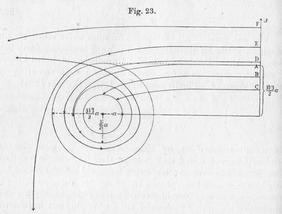 Light rays according to the Schwarzschild solution of the field equations.
Light rays according to the Schwarzschild solution of the field equations.
(source: M. v. Laue 1923, Die Relativitätstheorie. Bd. 2. Die allgemeine Relativitätstheorie und Einsteins Lehre von der Schwerkraft, second, revised edition Braunschweig: F. Vieweg, p. 226)
One hundred years after Einsteins groundbreaking General Theory of Relativity, this conference aims at an integrated understanding of how Einstein’s theory of relativity gained momentum. The focus is on the early reception of Einstein's theory in physics and philosophy and on the systematic questions that emerged shortly after Einstein's discovery of the field equations.
About one hundred years ago, in late 1915, Einstein came up with his gravitational field equations of the General Theory of Relativity. This is often celebrated as one of the most momentous events in the history of science, but at that time, a new theoretical understanding of gravitation had really only begun. No exact solutions to the field equations were known, and the implications of the theory were almost unexplored. It is no surprise, then, that the publication of the field equations gave rise to pioneering research – think of Karl Schwarzschild's black hole solution to the equations, Einstein's discussion about gravitational waves or his first relativistic world model. Since the theory has far-reaching implications for our understanding of space and time, the discovery of the field equations was also followed by intense philosophical discussions to which prominent proponents of positivism and neo-Kantianism, e.g. M. Schlick and E. Cassirer, made contributions of lasting importance. All in all it seems fair to say that, in November 1915, the theory had only just been born; what we now know and value as General Theory of Relativity with all its features only came into being during the investigations and discussions that ensued after the discovery of the field equations.
One hundred years after the first pioneering applications of, and reactions to, Einstein's momentous discovery, this conference aims at an integrated understanding of how Einstein’s theory of relativity gained momentum. The focus is on the early reception of Einstein's theory in physics and philosophy and on the systematic questions that emerged shortly after Einstein's discovery of the field equations. The conference brings together historians of science, philosophers, and physicists.
Research topics
including, but not limited to:
- cosmological models
- black holes
- gravitational waves
- unified field theory
- metaphysics of space and time
- epistemology of space and time
- the relationship between spacetime and matter
Registration Fee
CHF 50, students are free.
Support:
The conference is generously supported by the Tomalla Foundation, the UBS Kulturstiftung, the Swiss National Science Foundation and the Albert Einstein Center for Fundamental Physics at the University of Bern.

